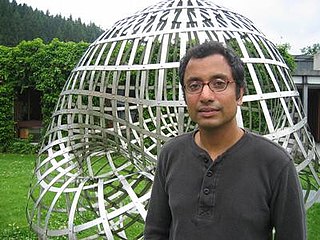Related Research Articles

Gilles Brassard, is a faculty member of the Université de Montréal, where he has been a Full Professor since 1988 and Canada Research Chair since 2001.
The Centre de recherches mathématiques (CRM) is the first mathematical research institute in Canada, located at the Université de Montréal.
Dorit Aharonov is an Israeli computer scientist specializing in quantum computing.
John K. S. McKay was a British-Canadian mathematician and academic who worked at Concordia University, known for his discovery of monstrous moonshine, his joint construction of some sporadic simple groups, for the McKay conjecture in representation theory, and for the McKay correspondence relating certain finite groups to Lie groups.
John Harnad is a Hungarian-born Canadian mathematical physicist. He did his undergraduate studies at McGill University and his doctorate at the University of Oxford under the supervision of John C. Taylor. His research is on integrable systems, gauge theory and random matrices.

Ravi D. Vakil is a Canadian-American mathematician working in algebraic geometry.
The André Aisenstadt Prize recognizes a young Canadian mathematician's outstanding achievement in pure or applied mathematics.
Luc Vinet is a Canadian physicist and mathematician. He was former rector of the Université de Montréal between 2005 and 2010. He is the CEO of IVADO, created in 2015 since August 2021.
Expenditures by Canadian universities on scientific research and development accounted for about 40% of all spending on scientific research and development in Canada in 2006.
Raymond Laflamme, OC, FRSC is a Canadian theoretical physicist and founder and until mid 2017, was the director of the Institute for Quantum Computing at the University of Waterloo. He is also a professor in the Department of Physics and Astronomy at the University of Waterloo and an associate faculty member at Perimeter Institute for Theoretical Physics. Laflamme is currently a Canada Research Chair in Quantum Information. In December 2017, he was named as one of the appointees to the Order of Canada.
Quantum pseudo-telepathy describes the use of quantum entanglement to eliminate the need for classical communications. A nonlocal game is said to display quantum pseudo-telepathy if players who can use entanglement can win it with certainty while players without it can not. The prefix pseudo refers to the fact that quantum pseudo-telepathy does not involve the exchange of information between any parties. Instead, quantum pseudo-telepathy removes the need for parties to exchange information in some circumstances.
Richard Erwin Cleve is a Canadian professor of computer science at the David R. Cheriton School of Computer Science at the University of Waterloo, where he holds the Institute for Quantum Computing Chair in quantum computing, and an associate member of the Perimeter Institute for Theoretical Physics.
The CAP-CRM Prize in Theoretical and Mathematical Physics is an annual prize awarded by the Canadian Association of Physicists (CAP) and Centre de Recherches Mathématiques (CRM) to recognize research excellence in the fields of theoretical and mathematical physics. The award winner's research should have been performed in Canada or in affiliation with a Canadian organization.
Harry Buhrman is a Dutch computer scientist, currently Professor of algorithms, complexity theory, and quantum computing at the University of Amsterdam (UvA), group leader of the Quantum Computing Group at the Centrum Wiskunde & Informatica (CWI), and executive director of QuSoft, the Dutch research center for quantum software.
François Lalonde is a Canadian mathematician, specializing in symplectic geometry and symplectic topology.
Debbie Leung is a University Research Chair at the Institute for Quantum Computing at the University of Waterloo, where she is also affiliated with the Department of Combinatorics and Optimization. She works in theoretical quantum information processing.
Elham Kashefi is a Professor of Computer Science and Personal Chair in quantum computing at the School of Informatics at the University of Edinburgh, and a Centre national de la recherche scientifique (CNRS) researcher at the Sorbonne University. Her work has included contributions to quantum cryptography, verification of quantum computing, and cloud quantum computing.
Stefanie Barz is a German physicist and Professor of Quantum Information and Technology at the University of Stuttgart. She studies quantum physics and quantum information in photonics.
Adrian Stephen Lewis is a British-Canadian mathematician, specializing in variational analysis and nonsmooth optimization.
Benjamin E. Rossman is an American mathematician and theoretical computer scientist, specializing in computational complexity theory. He is currently an associate professor of computer science and mathematics at Duke University.
References
- 1 2 3 4 2016 André Aisenstadt Prize in Mathematics Recipient: Anne Broadbent (University of Ottawa), Centre de recherches mathématiques, Université de Montréal, retrieved 2018-05-05
- ↑ "Broadbent Awarded Aisenstadt Prize" (PDF), Mathematics People, Notices of the American Mathematical Society , 64 (2): 148, February 2017
- ↑ "Anne Broadbent, scientifique superstar". Le Droit (in French). 2012-01-28. Retrieved 2021-04-30.
- ↑ Broadbent, Anne Lise (2004). Quantum pseudo-telepathy games. hdl:1866/14563. OCLC 969916927.
- ↑ Anne Broadbent at the Mathematics Genealogy Project
- ↑ Broadbent, Anne Lise (2008). Quantum nonlocality, cryptography and complexity. hdl:1866/6448. OCLC 969910426.
- ↑ Anne Broadbent, University of Ottawa Department of Mathematics and Statistics, retrieved 2024-02-06
- ↑ IQC postdoc earns prestigious Polanyi Prize, University of Waterloo Institute for Quantum Computing, November 29, 2010, retrieved 2018-05-05